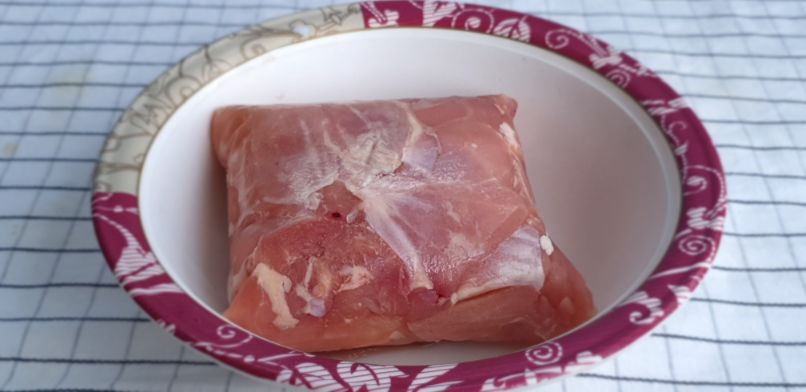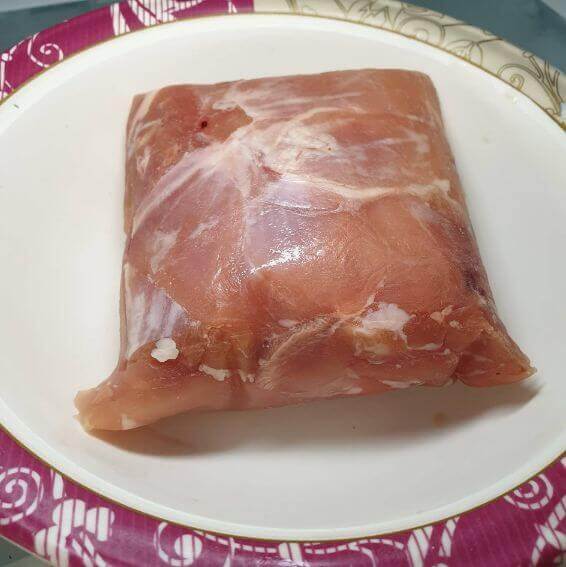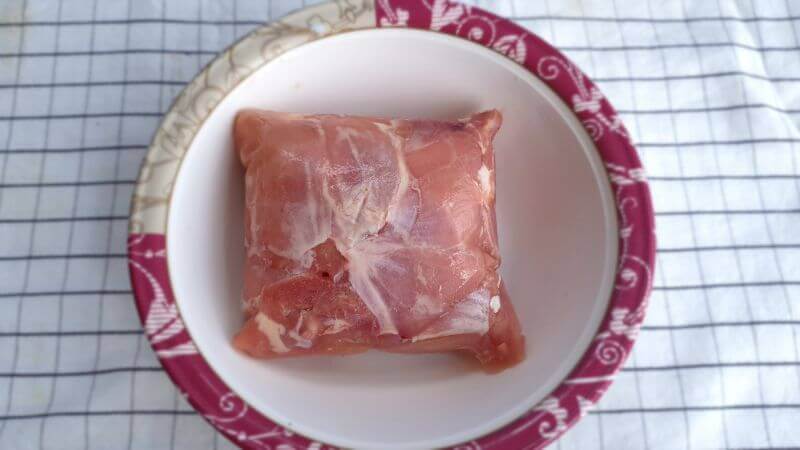The volume of poultry consumed globally increased from 34.6 million metric tons in 1990 to 132 million metric tons in 2021. So, by weight, poultry is the most consumed meat type in the world.
That’s an amazing figure, isn’t it? But let me tell you something more amazing.
The CDC estimates that every year in the US, about 1 million people get sick from consuming contaminated poultry. Yep, you read that right!
So, frozen chicken left out overnight – is it safe for consumption?
Keep reading to know.
Table Of Content
Is Frozen Chicken Left Out Overnight Safe To Eat?
Unfortunately, no – frozen chicken left out overnight at room temperature is not safe to eat. According to USDA, you can safely leave the raw chicken out at room temperature for about 2 hours or just an hour if the temperature exceeds 90 degrees Fahrenheit.
As you’re aware, bacteria grows prolifically when raw chicken is kept at temperatures between 40-140 degrees F. Therefore, if the chicken has been left out of the refrigerator for more than 2 hours, the bacteria will multiply to the point where the chicken is no longer safe to eat and, therefore, should be discarded.
The chicken may not look bad right off the bat, even though it was left out overnight, but it’s better to err on the side of caution. Depending on the room temperature, the chicken may turn a bit greenish, smell slightly sour, and develop a slimy texture. On the other hand, it may look completely normal.
Either way, discard the chicken.
I rummaged through a couple of cooking forums and threads to see if people actually toss out frozen chicken left out overnight or if it’s just a cautionary tale. Here’s what I found out:
Recommended Readings!
Why Does Taco Bell Make You Poop? 6 Reasons Why!
How Many Ounces Is A Cereal Bowl? The Answer May Surprise You!
Can You Mix Tequila And Vodka? Is It Even Safe?
Is Frozen Chicken Left Out Overnight Safe To Eat? Real Answers By Real People!
“If you live in a colder climate and the chicken was left out frozen and is still pretty cold the next day, I think it would be safe.”
“Chicken can stay unrefrigerated for at most two hours before bacteria start to set in. So, of course not!”
“Of course it is cookable. But the real question is whether it’s edible or not. And I’ll say no until you are up for some serious food poisoning.”
“I really wouldn’t. A whole day is way way way too much. Just no.”
“Nope. It has gone bad if it’s left out that long. Eating the chicken after 24 hours can make you sick even if you properly cook it.”
“As someone who’s worked in the food industry for decades, my answer would be that if chicken was left to thaw refrigerated, you’ll be fine. However, if the chicken was left out of refrigeration, and the internal temperature exceeded 41 degrees Fahrenheit for more than an hour, discard it due to the risks of illness involved.”
“Eating chicken left at room temperature for that long is not a good idea.”
“Chicken is supposed to be thawed at room temperature and not on the counter top.”
“Anything that sits out in the danger zone (40 to 140 degrees Fahrenheit) for more than a few hours will breed bacteria like crazy. Toss it.”
“When in doubt, throw it out.”
So, I guess we have established that it’s not safe to eat frozen chicken left out overnight. But if you’re still not convinced, here are a few signs to look for when inspecting the chicken.
How To Tell If Frozen Chicken Left Out Overnight Has Gone Bad?

Fresh raw chicken has a light pinkish color with white pieces of fat, little to no odor, and a soft and moist texture. If the chicken has gone bad, it will turn yellow, green, or gray. It will also give off a foul smell and develop a slimy texture.
The Chicken Is Discolored
Fresh raw chicken has a light pinkish color with some white fatty pieces. If the chicken has turned somewhat gray, green, or yellow, it’s a telltale sign of spoilage. You should discard the chicken.
Having said that, mild color changes in the chicken flesh are normal. For instance, you may notice a slight fading or darkening of the pink flesh. This is a normal and expected result of oxymyoglobin, a red protein pigment, transforming to metmyoglobin after exposure to oxygen.
Although this is not a sign of spoilage, this could indicate the chicken isn’t really fresh.
Besides the color change, if you notice other signs of spoilage like mold growth, throw the chicken out immediately. With chicken, unlike hard cheese, you can’t just cut off the part with mold growth and eat the rest.
You’ll have to discard the entire piece.
The Chicken Gives Off Foul Smell
An obvious sign of bad chicken is a foul smell. Raw, fresh chicken gives off a very mild scent or none at all. However, chicken that has gone bad will give off a sour or sulfur-like smell, similar to what rotten eggs smell.
But don’t just rely on smell alone to ascertain if the chicken is safe to eat or not. Since people’s sense of smell varies, not everyone will notice the same degree of change in the chicken’s smell.
Texture
Fresh chicken has a glossy and soft texture. Chicken that has gone bad will likely be slimy, sticky, or tacky. If there’s slimy residue in your hands after you’ve handled the chicken, toss it away immediately.
What Happens If You Consume Frozen Chicken Left Out Overnight?

Chicken is unanimously the most popular staple meat in many households. But this delicious and healthy source of protein comes with a high risk of bacterial contamination. Consuming frozen chicken left out overnight could result in a foodborne illness.
As discussed above, CDC reports that over a million people in the US get ill every year by consuming contaminated poultry. As a matter of fact, chicken has a high risk of causing food poisoning since it is contaminated with bacteria like salmonella and campylobacter.
Food poisoning is accompanied by uncomfortable and sometimes dangerous signs like a high fever, vomiting, bloody stool, dehydration, nausea, and chills.
In severe cases, food poisoning requires hospitalization and can even lead to untimely death. Thus, if you believe the chicken is spoiled, play it safe and just discard it.
In the case of salmonella poisoning, the symptoms usually begin about six hours to six days after the infection and will last four to seven days tentatively. The most common signs are diarrhea, stomach cramps, and fever.
On the other hand, the signs of campylobacter poisoning begin about 2 to 5 days after the person contracts the disease. Bloody diarrhea, fever, cramps, chills, and vomiting are some accompanying signs.
Frequently Asked Questions
Is It Okay To Leave Frozen Chicken Out Overnight?
Frozen chicken can be left to thaw in the refrigerator overnight but not on the countertop. At temperatures between 40-140 degrees F, bacteria multiply rapidly.
How Long Can Frozen Chicken Sit At Room Temperature?
Frozen chicken can sit at room temperature for 2 hours. However, if the temperature is above 90 degrees F, the chicken can only sit for 1 hour.
Can Frozen Chicken Thaw Overnight?
Yes, chicken can thaw overnight. In fact, thawing chicken in the fridge is the safest way to defrost it, although it is time-consuming. You have to plan a day ahead.
The day before you intend to cook your chicken, transfer it from the freezer to the fridge so it can thaw slowly.
Final Words: Is Frozen Chicken Left Out Overnight Safe?
No, according to USDA, frozen chicken left out overnight isn’t safe to eat. Raw chicken should not be kept at temperatures between 40-140 degrees F for more than 2 hours.
When kept at room temperature, the chicken becomes a breeding ground for bacteria. So, even though the chicken looks, smells, and feels normal, I’d suggest throwing away the chicken.
Over 1 million people in the US get sick from poultry contamination every year. You could be one of them.
Recommended Readings!
Can You Brine Turkey In A Metal Pot? Risk Of Heavy Metal Poisoning!
My Turkey Cooked Faster Than Expected | Should You Cover It Or Carve It?

